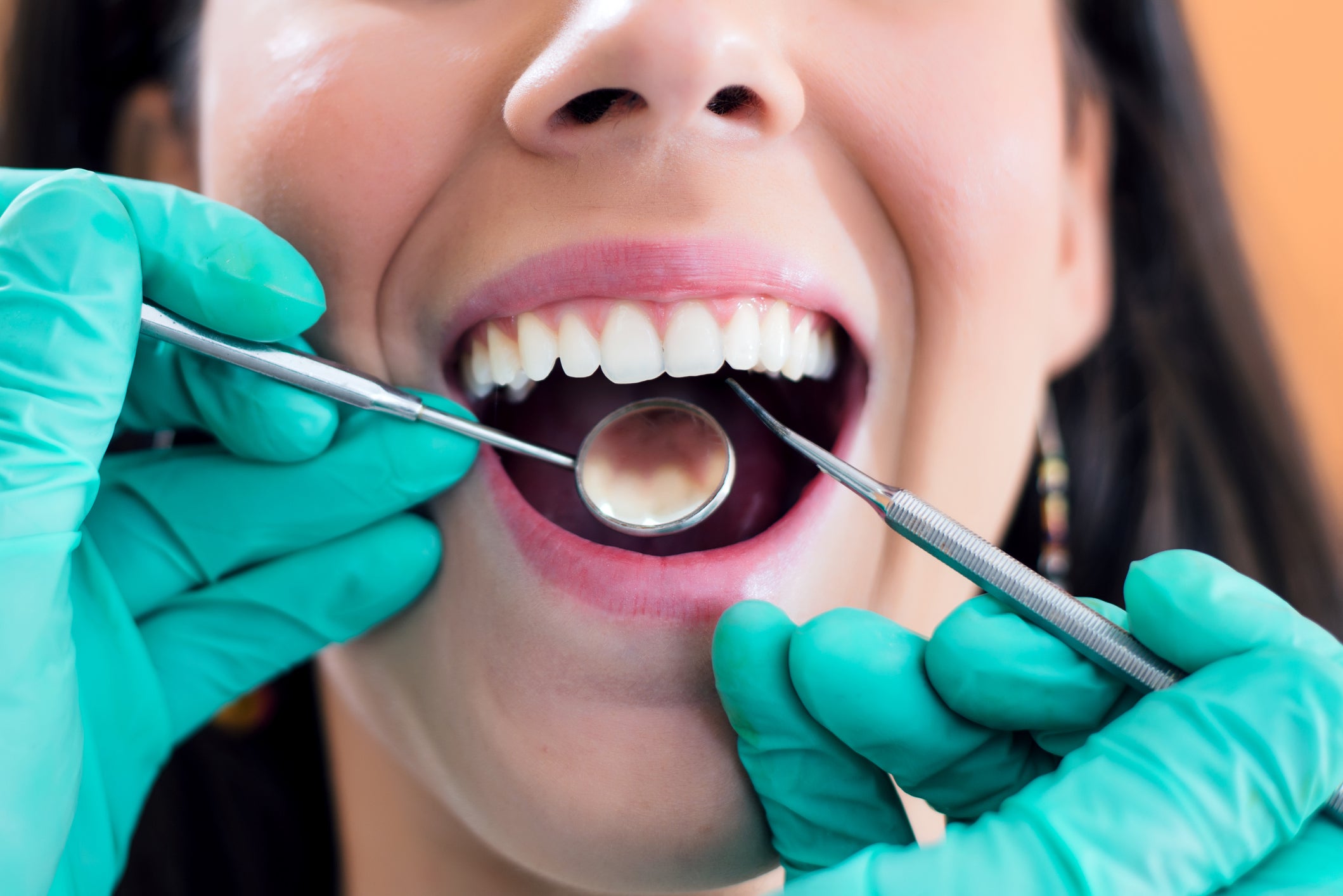-
Foods that Naturally Help Prevent Cavities

Healthy food for healthy teeth.
Avoiding Cavities
You have heard since childhood that eating too many sugary sweets will give you cavities. As an adult, you might even be aware that simple carbs, dried fruit, and acidic foods can all lead to the formation of cavities. What you may not know, though, is that you can be proactive in what you eat, and consume foods that actually prevent cavities instead of just avoiding foods. Read on- we’ve got the scoop on eating foods that are good for your teeth.
Healing Cavities
If you think about the human body, it’s pretty amazing, in the ways it heals itself. Our immune systems rush to repair damage caused by a wound or injury, which is remarkable. Did you know that the mouth can heal itself, too? Saliva helps remineralize your teeth and stop tooth decay in the early stages. However, as with other part of the body, the mouth’s healing process requires the support of the right vitamins and minerals. To heal cavities before they take hold, eat foods rich in the following nutrients:
- Calcium
- Vitamin D
- Vitamin K2
- Magnesium
- Phosphorus
- Xylitol
Understanding Cavities
Do you know how cavities form? It’s a complex process, and can take days, weeks, or even months. First, plaque forms when bacteria and food particles coat the surface of the tooth and are allowed to remain there. Plaque buildup increases as the plaque is fed by carbohydrates like sugars or bread, and as this happens, the plaque excretes acids that wear away at the tooth. If this is allowed to continue, the acid results in cavities, which are holes in the teeth. Once you have cavities, it makes it easier to spread infection and harder to maintain dental hygiene, creating a vicious cycle. That’s why it’s so important to fill your diet with foods that counteract cavities.
Foods that Help Prevent Cavities
While simple starches fuel cavity-causing bacteria, certain foods and drinks strengthen your teeth and lower the risk of cavities by reducing unhealthy bacteria in your mouth. Eggs and dairy provide vitamin D, and yogurt boosts immunity with probiotics. Another benefit of dairy foods, like milk, cheese, and yogurt, is that they’re rich in calcium, which strengthens bones and teeth. Other calcium rich foods include canned sardines and salmon (with edible bones), almonds, leafy greens, broccoli, seeds, beans and lentils, rhubarb, figs, and amaranth. Vitamin K2 helps the body move calcium from the bloodstream to bones and teeth, and this nutrient can be found in beef or chicken liver, chicken breast, butter, sauerkraut, ground beef, and salami. Beans are rich in phosphate, which helps remineralize teeth, and another nutrient that helps with this process is potassium, found in avocados. The magnesium you need to support healthy teeth is found in leafy greens, nuts and seeds, whole grains, quinoa, soy, tofu, and avocado, and blackstrap molasses. Sweet potatoes are very high in vitamin A, which promotes salivary function and balances oral pH and reduces cavity-causing bacteria. Tea also reduces harmful bacteria and drinking it can prevent cavities, but it’s also important to drink plenty of water, to rinse debris from your teeth throughout the day.
Providing Support to Your Teeth
Remineralizing your teeth requires preventing tooth decay from disrupting the natural remineralization process. In addition to a healthy diet, there are some other best practices that can help:
- Brush your teeth twice a day. Using gentle circles angled at your gums, brush with a soft-bristled toothbrush to help remove harmful bacteria from your teeth.
- Floss at least once a day. Floss with string floss or use an irrigator. Better yet, use both, to reduce double the plaque buildup.
- Use good toothpaste. High-quality fluoride toothpaste, approved by the American Dental Association (ADA), can help with remineralization.
- See your dentist regularly. Visiting your dentist twice a year for a deep cleaning and an exam can help catch oral health issues before they become problems.
Partner with Park 56 to Protect Your Teeth
If you’re looking for a dentist in New York, why not choose the dentist voted best in the city? At Park 56 Dental Group, we offer pediatric, prosthodontics, endodontics, oral surgery, Invisalign®, emergency, and sedation dentistry, all at the highest level of treatment. We serve the Midtown, Central Park, Upper East Side, Park Avenue, and all surrounding Manhattan and New York areas, with a patient-centered practice that has hours to fit your schedule. Schedule your complimentary consultation today by contacting us online or calling us at (212) 826-2322.
-
Plaque vs Tartar vs Cavities…What’s the Difference?

When you go to the dentist, a lot of unfamiliar terms may be thrown around. Sometimes, it can be confusing to keep up with all the instructions you’re being given and all the information your dentist is sharing with you. One source of confusion is the subject of plaque, tartar, and cavities. Do you know the difference?
- Plaque happens when sugary or starchy food mixes with the bacteria in your mouth. A collection of bacteria then sticks together on your teeth, causing you to feel like your teeth are fuzzy. What’s actually going is that the bacteria have formed a biofilm on your teeth, creating a slimy, sticky, white or yellow film. Plaque can cause bad breath, and if you don’t remove it, irritate your gums. You can remove plaque, however, by brushing, flossing, and using mouthwash.
- Tartar happens when you don’t sufficiently remove plaque. When that plaque stays on your teeth, it hardens, creating a sort of shield for bacteria. This hardened plaque is called tartar, or calculus. Tartar can’t be removed by regular dental hygiene, and must be removed by a dentist or hygienist. Tartar makes your teeth look discolored, and it traps plaque, making it more difficult to remove. In this way, plaque and tartar work together to remove minerals in your tooth enamel, causing tiny holes in the enamel.
- Cavities are the result of bacteria and acid making it through those little holes. The bacteria and acid make their way to the dentin layer of your teeth, which communicates with your nerves and causes sensitivity. They then move on to the inner tooth, where the nerves and blood vessels are located, called the pulp. The pulp becomes swollen and irritated, causing pain and permanent tooth damage. This damage is known as tooth decay or cavities.
As you can see, one thing leads to another when it comes to plaque, tartar, and cavities. That’s why it’s so important to brush and floss daily and see your dentist for regular cleanings. While you’re there, the dentist might recommend further treatments to combat plaque, tartar, and cavities. Dental sealants, for example, can help protect against plaque and tartar, and fluoride treatments can make your teeth more resistant to acid. Talk to your dentist about the best ways to care for your dental health and prevent tooth decay.
Whether you need a cleaning or good dental advice, choose the practice that was voted best dentist in NYC! At Park 56 Dental Group, we offer pediatric, prosthodontics, endodontics, oral surgery, Invisalign®, emergency, and sedation dentistry, all at the highest level of treatment. We serve the Midtown, Central Park, Upper East Side, Park Avenue, and all surrounding Manhattan and New York areas, with a patient-centered practice that has hours to fit your schedule. Schedule your complimentary consultation today by contacting us online or calling us at (212) 826-2322.
-
How to Reverse Cavities

No one wants to hear their dentist say, “You have a cavity.” The key to good oral health and a cavity-free mouth is to understand why cavities form so you can take steps to prevent and reverse them.
What Causes Cavities?
Cavities are the result of untreated tooth decay, which occurs when your teeth are repeatedly exposed to acid and bacteria. Your diet and oral care routine play a significant role in the formation of cavities. When you eat sugary or starchy foods, a sticky substance called plaque forms on your teeth. The bacteria in your mouth feed on this plaque, producing acid as a waste product. This acid then eats away at your teeth.
Tooth decay occurs in five stages:
- Demineralization: Your teeth lose and regain minerals all day long. The problem occurs when depleted minerals are not restored.
- Enamel decay: The outer layer of your teeth decays first.
- Dentin decay: As the problem spreads to the dentin layer, you may start to feel pain.
- Pulp decay: Pain and inflammation can become severe if decay reaches the inner pulp of your teeth.
- Abscesses: When bacteria inside a cavity spread beneath the pulp, a pocket of pus can form, causing a painful abscess.
Signs of Cavities
Watch out for these signs that your teeth are starting to decay:
- White spots on your teeth (a sign of mineral loss)
- Grey, black, or brown spots on your teeth (a sign of decay)
- Toothaches
- Painful chewing
- Sensitivity to hot, cold, or sweet substances
- Pits or holes in your teeth (detectable through an X-ray)
How to Prevent and Reverse Cavities
By the time a cavity is noticeable, it may be too late to reverse the damage naturally. However, with the proper care, you can prevent cavities and even help early tooth decay heal on its own. Here’s what to do:
- Improve your nutrition: Replace sugary, starchy, and acidic foods with those rich in calcium, vitamins B and D, magnesium, and iron.
- Keep up your oral care routine: Remove bacteria-feeding plaque from your mouth by brushing your teeth morning and night, flossing at least once a day, and rinsing with mouthwash.
- Remineralize your teeth: Fluoride is the key to preventing mineral loss and replacing lost minerals. You can get fluoride from toothpaste, mouthwash, tap water, prescription fluoride tablets, and in-office fluoride treatments.
- Visit the dentist every six months: Dentists help prevent cavities by providing routine checkups and cleanings. They can also reverse cavities with fillings, crowns, root canals, and implants. These dental restorations are usually covered by insurance.
To keep your mouth cavity-free, be sure to visit Park 56 Dental, the best dentist in New York. We have more than 20 years of experience pampering our patients in a spa-like setting. For more oral care tips or to schedule a free consultation with our NYC dentist, please call us at (212) 826-2322 or contact us online.
RECENT POSTS
categories
- Uncategorized
- Cosmetic Dentistry
- Veneers
- Healthier Teeth
- Teeth Whitening
- Dental Health
- Video
- Dental Emergencies
- Invisalign
- Dental Implants
- Root Canal
- Sedation Dentistry
- Infographic
- Dental Crowns and Bridges
- Dental Anxiety
- Gum Disease
- COVID-19
- Bad Breath
- New York Dentist
- Cut out sugar
- General Dentistry
- Oral Health
- Oral Cancer
- Dry Mouth
- Gum Health
- Toothache
- Dental Sealants
- Cavities
